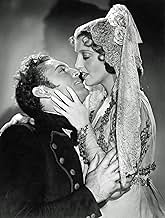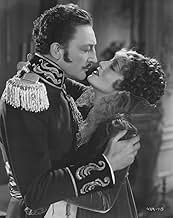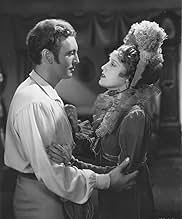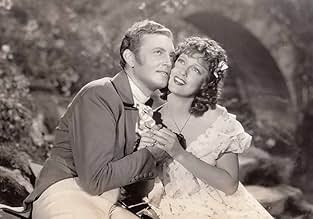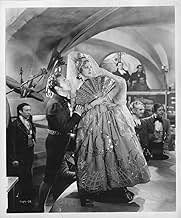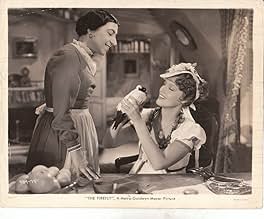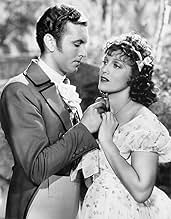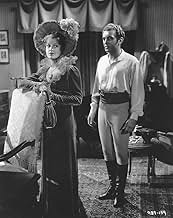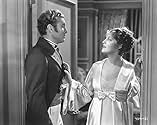Adicionar um enredo no seu idiomaNina, Spanish singing spy, seduces French officers for intel on Napoleon's Spain plans. In Bayonne, she falls for Diego/Captain Andre, who's spying on her. Captured during invasion, they reu... Ler tudoNina, Spanish singing spy, seduces French officers for intel on Napoleon's Spain plans. In Bayonne, she falls for Diego/Captain Andre, who's spying on her. Captured during invasion, they reunite while nations are at war.Nina, Spanish singing spy, seduces French officers for intel on Napoleon's Spain plans. In Bayonne, she falls for Diego/Captain Andre, who's spying on her. Captured during invasion, they reunite while nations are at war.
- Direção
- Roteiristas
- Artistas
- Prêmios
- 3 vitórias no total
- Marquis de Melito
- (as Douglas Dumbrille)
- King Ferdinard
- (as Tom Rutherfurd)
- Duval
- (as Corbett Morris)
- Jail Guard
- (não creditado)
- Civilian Wife
- (não creditado)
- Fruit Vendor
- (não creditado)
- Gypsy
- (não creditado)
- French Soldier Requesting Flowers
- (não creditado)
Avaliações em destaque
The core of the plot is duty to one's country. Though Allan Jones and Jeanette MacDonald are on opposite sides and love each other, at some point each betrays the other at some point in the movie to gain a tactical advantage for France or Spain.
The Rudolf Friml-Otto Harbach-Oscar Hammerstein II, is mostly retained for the movie. One new song, based on a Friml instrumental composition called Chanson, is given a lyric by Bob Wright and Chet Forrest and arranged by MGM's house composer Herbert Stothart. Their combined efforts yielded The Donkey Serenade and provided Allan Jones a signature song for the rest of his career.
Jeanette was taking a rest from her usual singing partner, Nelson Eddy, and her teaming with Jones was felicitous. They are a pair of winning songbirds. Maybe had Jones stayed with MGM, he and MacDonald might have made some more films together. Maybe he might have played some of the parts that Nelson Eddy did opposite her. But he probably was right in thinking he'd always be number 2 at MGM, so he moved to Universal.
Beautiful singing and a decent plot in this one. Go see it.
There is a beautiful cantina singer (and dancer!) named Nina Maria (Jeanette MacDonald) whom men fight over. She works as a spy for Spain. When Napoleon invites Ferdinand--who appears guileless--to France for a meeting, Nina Maria must leave for France immediately to determine if Napoleon's intentions are honorable.
She is pursued there by Don Diego (Allan Jones), a man smitten by the senorita. Along the way, he tries to charm her by singing "The Donkey Serenade"--one of the most memorable moments in the film.
When they arrive in Bayonne, France, things get complicated. The senorita discovers someone is on to her. The love story becomes more political as Nina Maria must make alliances based on trust. Will she let her heart guide her actions? What is Napoleon's true objective?
The two leads are excellent. Much of the surrounding cast portray military characters and they are very strong.
The lavish sets and a large number of extras give the film a feeling of richness, as when Joseph Napoleon and his military escort ride into Madrid.
Part romance, part political intrigue, "The Firefly" entertains while Jeanette MacDonald shines.
MacDonald plays Nina Maria Azara, a singer, who is also a spy for Spain during the Napoleonic Wars. She is to seduce French officers and find out Napoleon's plans for Spain.
She meets Don Diego, who pursues her while she is working as a singer. She has to stave him off in order to meet with those who can give her information, among them Major de Rouchemont (William).
Don Diego keeps showing up, including on her trip to Bayonne. There, the famous Donkey Serenade is introduced. Unknown to her, Don Diego is actually Captain Andre, who is sent to Spain to spy on her.
The story is a backdrop for all of the music, and there is a ton of it. MacDonald's voice was highly touted; with today's ears, it was a lovely voice, particularly in the middle, but I was never crazy about her top notes. I think it was just the way women were trained by then. She was a beautiful woman and a fine, fiery actress, and her popularity was well deserved. She does a good job here.
Allan Jones was not the most sparkling presence -- he certainly was no match for MacDonald in that department -- but he truly had a beautiful voice. Warren William was very good in a villainous role.
Most of the music was written by Rudolf Friml and Herbert Stothart, so you need to like operetta in order to like this film, and also classical voices.
Você sabia?
- CuriosidadesThe song "The Donkey Serenade" was not in the original stage production. It was written for the film, but the music was adapted from the song "Chansonette," from the stage version of "The Firefly."
- Erros de gravaçãoWhen by the bridge we see a female with very long black plaits walking with her beau across the bridge. Not long after we see a closer shot of them about to walk across the bridge.
- Citações
Don Diego: You have one bad habit.
Nina Maria Azara: Oh, yes? What?
Don Diego: You're always saying good-bye.
Nina Maria Azara: Very well then, I won't say good-bye. I'll just go!
- Cenas durante ou pós-créditosEach time the dancing girls dance across the screen, a new screen credit is revealed.
- ConexõesFeatured in MGM Parade: Episode #1.25 (1955)
- Trilhas sonorasLove Is Like a Firefly
(uncredited)
Music by Rudolf Friml
Lyrics by Bob Wright and Chet Forrest
Sung by Jeanette MacDonald
Principais escolhas
Detalhes
- Data de lançamento
- País de origem
- Idiomas
- Também conhecido como
- The Firefly
- Locações de filme
- Alabama Hills, Lone Pine, Califórnia, EUA(Donkey Serenade sung)
- Empresa de produção
- Consulte mais créditos da empresa na IMDbPro
- Tempo de duração
- 2 h 11 min(131 min)
- Proporção
- 1.37 : 1


